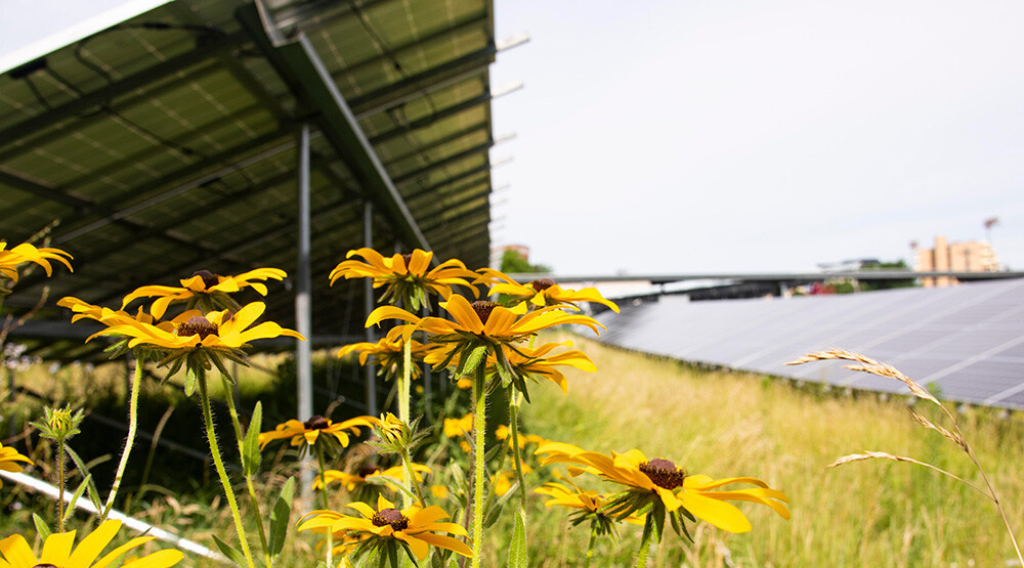
GPI will lead a new pilot project supported by General Motors’ Climate Equity Fund to help communities in Michigan and Ohio with making progress on equitable vehicle electrification.
Local governments have a vital role in an equitable transformation to electric vehicles. Small- and medium-sized cities face the same challenges as large cities in this transformation. Yet, they lack the capacity to tackle them.
GPI is partnering on the project, called EV Ready Communities, with Clean Fuels Ohio, the Michigan Municipal League Green Communities Program, and the Ecology Center in Michigan to provide on-the-ground technical assistance to participating communities.
I recently discussed this new pilot project with Vice President Lola Schoenrich. We discussed why it’s needed, the project goals, and how it draws on existing best practice-based certification programs and builds on GPI electric vehicle-ready pilots in Minnesota, Connecticut, New Jersey, and Maryland.
Q: Why was the EV Ready Communities project created?
A: Local governments face complex challenges to ensuring equitable vehicle electrification. While most of the US population lives in a city, those metropolitan areas include hundreds of smaller cities. For example, the Detroit area has more than 180 cities and townships. Small- and medium-sized cities need support to solve the challenges related to equitable vehicle electrification.
EV Ready Communities is a best practice-based certification program that brings together a partnership of organizations that know how to support local governments with technical assistance, peer learning, guidance, and more.
Q: What challenges is the EV Ready Communities project aiming to address?
A: Drivers need easy access to affordable electric charging. That’s a requirement for the widespread adoption of electric vehicles. And local governments need assistance with expanding access to electric vehicles and charging. Small- and medium-sized cities often lack the capacity to address the challenges of expanding access on their own.
Studies have identified barriers such as local permitting and grid interconnection delays that can lead to higher soft costs, mirroring barriers faced by the early solar PV market.
Accessible charging means we need both off-highway electric vehicle and corridor charging infrastructure. A hard-to-navigate landscape of government and utility regulatory policies and practices has hindered that infrastructure.
And low-to-moderate income (LMI) and Black, Indigenous and people of color (BIPOC) communities have additional barriers to accessing electric vehicles and infrastructure.
Q: What are the barriers to accessing electric vehicles and charging for LMI and BIPOC communities?
A: LMI and BIPOC communities have intersecting barriers limiting their access to electric vehicles. These barriers limit their access to the broader health, economic, and environmental benefits of vehicle electrification.
Equitable solutions for expanding access include charging at rental housing, multi-unit dwellings, workplaces, and public rights-of-way. Underserved communities also need increased access to transit, car, bike, and scooter sharing.
Q: Why the focus on local governments?
A: Local governments are in a unique position to solve these challenges.
Local governments can use their policy, regulatory, and permitting authority to either speed up or inhibit an equitable transition to vehicle electrification. Only local governments can ensure the availability and integration of public and private services like transit, last-mile mobility solutions, and public charging.
Q: How can EV Ready Communities support these communities in addressing these challenges?
A: We have a successful track record of supporting local action by providing clear guidance, peer connections, technical assistance, and recognition.
The EV Ready Communities program is modeled on and will collaborate with other effective local government certification programs, such as SolSmart, Minnesota GreenStep Cities, Michigan Green Communities, and Power a Clean Future Ohio.
The EV Ready Communities program framework was developed after three years of providing technical assistance to Minnesota cities. The framework was revised in 2021 with focus group input from communities in Minnesota, Pennsylvania, and Indiana.
As a part of the General Motors-funded initiative, we will ensure that lessons from one state are quickly integrated by all by connecting the technical assistance providers for our pilots in Michigan, Ohio, New Jersey, Connecticut, Maryland, and Minnesota.
We will apply our prior success to accelerate electric vehicles and infrastructure rollout equitably. The project will also help connect the participating communities to federal funding available through the Federal Infrastructure Investment and Jobs Act.
Q: What do you hope to achieve with the EV Ready Communities pilot project?
A: Our goal is twofold. First, we will support at least 25 municipalities in Michigan and Ohio in developing a community electric vehicle roadmap, securing funding, and getting projects off the ground. Second, these pilot programs will help us to further improve the program model as we expand to other regions and states in partnership with other national organizations.


